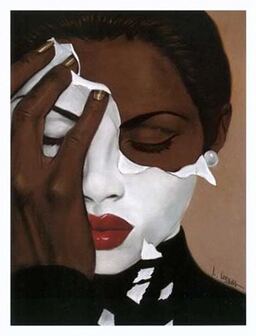 image source: prophetspeaks image source: prophetspeaks My editor at Thomas Nelson (HarperCollins), Kimberly, wrote the following message to me in the editorial notes for my next book, When Stars Rain Down: "I don’t think I can start this editorial letter without acknowledging that my editorial eyes are white. I’m acutely conscious that I’m editing a story written by a Black woman about Black people, and there might be moments—despite my best efforts to listen and educate myself—where I get something wrong because of that. If that happens, please know that you have the space to push back and let me know." I have been fortunate in my writing career to have some great editors for my work and in most cases, they have all been white. And for any of you who have ever read my writing, you know my stories generally involve Black, southern, rural characters. So, I always have a bit of trepidation when I surrender my work to an editor because often they don’t share the same region or ethnicity as my characters, and because of that fact, I prepare myself to be offended or worse, put in a position where I have to defend my artistic choices, which aren’t really choices, but are more like obligations I owe to the ancestors to get their stories down correctly and with the utmost respect. Therefore, when I received that note from Kimberly, I breathed a sigh of relief. In a way, I looked at my characters and said to them, “We don’t have to fight today. She gets it.” And what I mean by that is I could be myself and my characters could be themselves. They could split infinitives and use colloquialisms and not feel judged. They could be domestic workers and sharecroppers by day, and complex, loving souls at night without worrying about the white gaze reacting in a condescending manner towards them. They could follow the traditions of their ancestral religions and Christianity and not be judged harshly for the amalgamation of those multiple, spiritual beliefs. They could celebrate births and deaths with loud screams and shouts, and no one would call them out on it. That is a huge deal for a writer in general, but it is a mind-blowing deal for Black writers or writers of color. We are used to writing our stories and then defending them like someone in a court of law because often times there is no one in the room who truly “gets” them. We struggle to make everything “clear” to the point of sometimes sacrificing the story for an overabundance of telling, not showing. A survey by Lee and Low found that “in the [publishing] industry overall, 76% of employees are white, 74% are cis women, 81% are straight, and 89% are non-disabled. At the executive level, 78% are white, 60% are cis women, 82% are straight, and 90% are non-disabled” (Maher). This explains why it is so difficult for those of us who are considered “outside the canon” to find homes for our work. For the writer who is The Other, it is often difficult getting one’s foot into the door, but then once you make it on the other side, it becomes even more complicated because so often editors will want to “sanitize” the work or make the work have more of a crossover appeal. In the 1991 Robert Townsend movie, The Five Heartbeats, one of the characters, Eddie King, said something that stuck with me all of these years later when it came to “crossing over” with our music or in my case, my writing. King said, “Cross-over ain’t nothing but a double-cross. Once we lose our audience, we’ll never get them back. Next thing you know, they will try to change our sound.” More than being published, I have always been most concerned with being authentic to the stories I told, and the people I imagined were my readers. Granted, I want as many people as possible to read my work, but I specifically care what readers who come from my background think. I want them to read my upcoming novel, When Stars Rain Down, and say to themselves, “That’s my Big Mama. Or that’s my Cousin. Or that’s me.” I want those readers to feel a kinship to the imaginary characters I’ve created, so for them, I am always willing to fight for every word, every phrase, every symbol that reflects Black, southern, rural culture. Therefore, you cannot imagine how excited I was to receive that message from Kimberly. It’s never about the ethnicity of the editor for me (or their gender, sexuality, etc.), it’s always about “Will they listen to me? Will they recognize that I am the authority in this world?” Once that happens, I am always open to the fine-tuning that I am asked to do. When I know I am not going to hear, “Does she REALLY have to speak in broken English?” OR “Is this really something a Black person would say or do?” I then have the freedom to allow my characters to soar unapologetically, and for me, that is all that matters. Maher, John. “New Lee and Low Survey Shows no Progress on Diversity in Publishing.” Publisher’s Weekly. 29 January 2020.
4 Comments
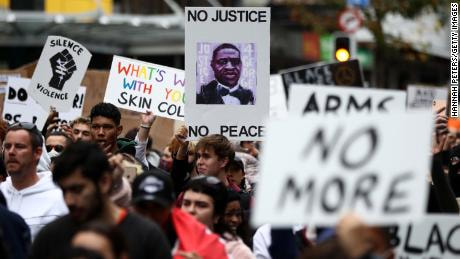 CNN Photo CNN Photo A few years ago, I was playing competitive tennis in my age range. I was in my forties and although I didn’t win every match, I ALWAYS went hard! I didn’t mind slamming a ball with all my might towards my opponent, and there wasn’t a ball I wasn’t willing to try and run down even if I sort of knew there was very little likelihood that I would make it to said ball in time. I NEVER stopped fighting for that point. Never. I played my last tennis match in January of 2017 due to health issues, but I would like to believe I still have that fighting spirit even now in my writing. Especially now. Too much is happening for me and my pen to stand on the sidelines. I might not be able to get out there and march; I might not be able to run for political office; I might not be able do a lot of things that others can, but I can write a poem in protest. I can write a letter to the mayor or the police chief. I can make slogans to go on the signs of those who can march. I can donate my time and talent to helping write a letter for someone who has been treated unfairly at a march or rally and they need to “document the moment” in writing. I can write an essay like this encouraging my friends who write to dedicate one blog post to saying “Black Lives Matter” or “Police Brutality is Wrong” or “Let’s Get Out and Vote.” I can write a daily post on social media that shows the world that I stand for justice and I don’t care who knows it. I can find a way to use my words to give back because giving back is the whole point of this dance around this planet. If your entire existence is based on receiving and not giving, why are you here? If your existence is based on never speaking the truth except in low whispers or in someone’s Messenger box, then why are you here? IF you have nothing “writerly” to offer to this moment and you call yourself a writer, I wonder about you. I wonder why you are wasting your talent. I wonder why you even bother to write if you truly have nothing to say about right now. I loved playing tennis from the time I first started playing in high school, but I was never going to be Serena Williams. But words? Man, words have always been my thing. Not because I was some child prodigy or a savant of the written word, but because like Serena, I have tried to dedicate my life to getting the word on the page just right. Serena says she will spend hours hitting the same shot over and over. I have sat and labored over the right word or the right sentence for hours, even when others would have walked away and said the sentence was fine. So why in the world would I NOT use my words to rebel? Why wouldn’t I use my words to say, in the words of Al Sharpton, “America, get your knee off our necks”? Why wouldn’t I wax poetic about injustice, racism, intolerance, hatred, white supremacy? Why wouldn’t I take time out of my busy writing schedule to shed a verbal light on the marching going on just miles from my home? I can’t march with them, but I can tell the story. I can be an Oracle. I can be a Griot. I can commemorate this moment and say on behalf of myself and my brothers and sisters in the fight, Enough. We’ve had enough, and we will not take any more. The season of hatred on our watch, is over. I can say that. I can write that. 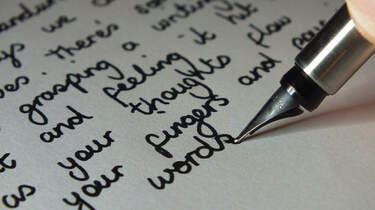 The first poem I ever wrote was a few days after I was sexually assaulted. It was the summer of 1979. I was eleven. Most of what I wrote before that was stories, but I can’t tell you what they were about. I have vague memories of romantic stories about faery princesses who looked like me or stories where my birth mother mysteriously found me and rescued me from whippings and hurtful words from my adopted mother, but I couldn’t pull up the exact words to save my life of any of those little girlish stories. But that poem that I wrote days after being violated, I remember it verbatim. I remember being on my bed with my matching Cinderella sheets and comforter pulled over me like a cocoon. I remember daddy asking me if I wanted to go to Ozark with him and me saying no. I pretty much stayed to myself that summer. I felt exposed on the outside, so my bed became my refuge but so did the words. So the eleven year old who now had to see the world with a different clarity wrote this: My heart began racing, as he began chasing I knew that the games had begun Uncle I love you, but don’t make me touch you Oh god make him leave me alone. If the sun would just come out, or if mommy would find out Then maybe I wouldn’t have to run But the night will not let up, so I will just shut up And pray for the day that I’m grown. The trauma I was experiencing when I wrote this poem was unimaginable. No child should ever have to live with the pain of being assaulted and the pain of not being believed BUT I survived thankfully because of the writing. I chose, even at a young age, to allow the writing to be my balm of Gilead. I know it is not easy trying to find the “right words” when it feels like the world is burning all around us, but if you look at the writing as your one place where you are in control, then maybe it can bring you solace. I know I can’t control this current administration. I know I can’t control racists who prey on black and brown people. I know I can’t control this virus that is ravaging our country. But I can control my imaginary worlds. Even when my characters are struggling with their own lives, I get to control what happens, and for me, a control freak from way back, I need to be able to control something. So, for me, the writing is truly a balm. Don’t worry about sounding academic or literary when you write during this season we are living through. Just let the words carry you away. Write with the same wild abandonment of a child. No concern about form or structure. No concern about character development. No concern about plot or story arch. Just the words. The Holy Bible says, “In the beginning was the Word, and the Word was with God, and the Word was God.” Whether you believe in a God or not, there should be something comforting in thinking that before there was an US, there were words (yes, I’m adding my own spin to that verse.). I imagine these words just floating around the atmosphere, waiting for thinking beings to BECOME so that these words could attach themselves to these beings. When my daddy was dying of lung cancer, I would sit beside him at chemotherapy and scribble in my notebook. The more anxious I became, the more I wrote. I didn’t realize it at the time, but my first book, Drinking from a Bitter Cup was being born during all of that trauma. I remember one time daddy looked over at me and smiled and said, “You’ve been writing in notebooks since you were a little girl. Whatcha writing about?” I remember simply saying, “Everything.” Write yourselves into a better place. It doesn’t have to be publishable. It just needs to free your soul for a brief time. Writing during a pandemic or any other traumatic time is difficult. Mainly because we expect our writing to be the same as it is during normal times. Trust me when I say, it won’t be, but that is okay. You’re using your writing as triage. It is there for you to use to prop you up until the storm is over. Here are some strategies I use to get myself to a good space: 1. Clean the space of negative energy. Meaning, turn off the television or turn it to something calming. I often have mine tuned to the Game Show Network or The Great British Baking Show. Those sounds are my white noise. I also listen to good music. Sometimes the music of the era I’m writing in. 2. Set small, attainable writing goals. My friend and the Associate Director for Communications and Alumni Relations at Spalding University in the low residency MFA program, Katie Yocom (author of: Three Ways to Disappear), gave me the best writing advice ever several years ago. She said, “Make your writing goal one sentence per day. You’ll probably write more, but if not, you will at least have a goal that is attainable.” I have followed this advice ever since and so far, I have seldom missed my “goal.” 3, Treat yourself when you do reach your goals. It can be something as simple as eating ice cream or something major like, “Once I reach 40,000 words I am treating myself with a new laptop.” You decide the goals and the treats. 4. Create an outline. If you don’t know where you are going, you will meander about, wasting valuable writing time. I spend months figuring out my story arch. Knowing that arch allows me to continue on a forward path no matter if we are in the midst of a pandemic or if times are going great. Either way, I know what I need to do, so I just get down and get busy doing what I have to do. 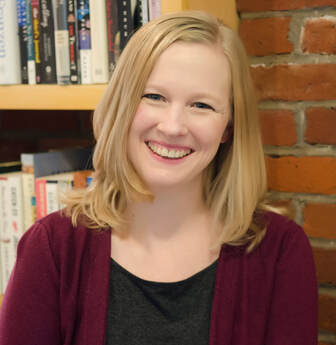 Hello, Alice. Welcome to my blog, and thank you for doing this interview. For those who don’t know, Alice Speilburg, of the Speilburg Literary Agency, is my agent, and because so many people have asked me about Alice and her agency, I thought this Q & A might answer some of the questions I frequently receive. Alice, please, tell my readers about you and your agency First, thanks so much for having me on your blog! It’s always fun for me to connect with the writing community through one of my own clients. I’ve been working in book publishing now for more than a decade, which is hard to believe sometimes. I started my career in NYC, but I’ve always been a Kentucky girl at heart, so after a few years of learning the trade, I made my way back and launched Speilburg Literary Agency. We have three agents: Eva Scalzo, Lindsey Smith, and myself, and we represent authors writing commercial fiction and nonfiction, for teens and adults. We each have different tastes, but we’re all looking for authors who are compelled by some sort of passion to write books that fascinate and inspire. How did you become a literary agent? I knew I wanted to pursue a career in publishing, so after graduating college I moved up to NYC and managed to get a job at a publishing company. As an editorial assistant, I started interacting with agents. I loved how they could follow an author throughout her entire career, build a partnership from the very beginning and watch it grow. I did a few informational interviews with agents around the city, and then got a job as a literary assistant at a boutique agency in Brooklyn. This is an apprenticeship job, and I soaked up as much as I could about contracts, pitches, relationships with editors and authors, and how to handle the inevitable snags on the way to publication (or afterward). Eventually I started taking on my own clients and building my list. Is it difficult working in Louisville, KY versus New York? Not really, no. It helps to be in a city where there’s a thriving writing community: published authors, small presses, independent bookstores, literary nonprofit organizations, maybe even a few other agents. Louisville has all of those things, and I feel a part of that network. But I also feel part of the larger publishing community, and while the hub is undeniably in NYC, for years it’s been slowly sprawling across the nation. We’re an industry that works well remotely, as long as there’s WiFi and cell service. I generally make at least one annual trip to NYC full of coffee and lunch appointments to make a tactile impression, but most of my connections are maintained by phone and email. What are some books coming out this year from your authors that you are excited for the public to know about? Quite a few! It’s a tough year for book releases, especially for my debut authors, so I’m glad of a chance to highlight them. In fiction, Beverly Bell’s THE MURDER OF MARION MILEY just released, a novel based on the the 1941 murder of beloved young golf star Marion Miley. It’s a Kentucky story, a story of an incredible woman who rose to every challenge, whose life was cut tragically short, and the giant manhunt to bring her killers to justice. Melissa Lenhardt has a new novel releasing at the end of the summer, THE SECRET OF YOU AND ME, her first contemporary women’s fiction novel about two women who are given a second chance at love after their parents tore them apart when they were young. A beautiful love story, but still full of all the grit and hard truths that Melissa’s fans have come to expect. And I have a few nonfiction projects this year too, all debuts! Jude Warne’s authorized biography AMERICA THE BAND released this spring, on America’s 50th anniversary, for all those 1970s folk rock fans. Farrah Alexander’s RAISING THE RESISTANCE is coming out in August as a guide for mothers who feel compelled to stand up for what they believe in, but they aren’t quite sure where to start. Farrah offers practical advice on how to dip your toe into activism -- or dive in if you’re ready -- and incorporate it alongside raising your kids. Environmental journalist Jeremy Hance’s memoir BAGGAGE takes a deep look at his experience with mental illness and how traveling to the world’s wild and remote places to connect with species that are struggling to survive has helped him cope. That’s due to release in October. A lot of authors out there are debating if they need an agent, what are the advantages of having an agent versus not having an agent and when should an author seek out agent representation? An agent is an author’s trail guide on a long and arduous hike. She has a map and a compass, and she’s done it many times before. An agent can help you polish the manuscript before submission and negotiate the terms of your publishing deal and your contract. But she’s also someone you can turn to when something doesn’t feel right, when the editor’s notes seem too intense, when you’re feeling neglected, when the publisher asks you to do something you’re uncomfortable with. She keeps track of your royalty statements, makes sure you’re getting paid on time and that the payment that came in is correct. And when you’re ready for your next project, you can bounce ideas off of your agent and work with her to craft a pitch, to make sure you’re presenting the strongest case to the publisher, and taking the best path for your writing career. You should seek an agent if your manuscript is complete, polished after several drafts, and you’re planning to publish with a large commercial publishing house. Or maybe you’ve already done that, but you feel like your publishing team is incomplete and you’d like someone by your side for career management and guidance on your next project. Writing can be a lonely business, but publishing doesn’t have to be. What types of books are you looking to represent? I’m looking for fiction and nonfiction, and in both, I’m interested in stories I haven’t heard before, or an age-old tale with a twist: a different sort of protagonist or perspective than we’ve seen in the past. In terms of genre, I represent women’s fiction, mystery/thriller, sci-fi/fantasy, magical realism, and historical fiction; in nonfiction I like narratives in history, pop science, food, music, art, environmentalism, social justice, and other cultural topics. What type of authors are you looking to represent? I’m looking for authors who have honed their writing skills over time and have a passion for their subject matter. I would love to represent authors from all walks of life, as I strongly believe that the world’s library could use a refreshing update with new voices and perspectives. Are there any books that you might deem well-written but would not take right now because the market is already flooded with those types of books? There are two market concerns that might negatively affect my decision on a well-written manuscript: either the market is oversaturated or the market has been dead for a while and continues to suffer. For example, editors looking for historical fiction are primarily looking for 20th century historicals right now, so an Elizabethan novel might be a difficult sell, especially for a debut author. For an example on the saturation side, some recent trends in fiction have been mythology-based fantasy and women’s domestic thrillers. At this point, while most editors are still acquiring in these areas, they’re looking for different approaches to each sub-genre: an international setting or an unlikely protagonist. Eventually, we expect readers to turn to something new, so we’re taking on these types of books only when they’re above and beyond, when they surprise us. If a writer pitched a mainstream domestic thriller to me, and I fell in love with the writing but knew it would be a tough sell, I might ask them to send me their next book instead. Is your agency currently taking manuscripts, and if so, how does an author query you? I’m open to queries through June 15, and my colleagues Eva Scalzo and Lindsey Smith are also open right now. You can find each of our guidelines on the agency website, but I request a query letter and the first three chapters of the manuscript (or a proposal for nonfiction) to be submitted to my QueryManager site: http://QueryMe.Online/AliceSpeilburg What are some things you are looking for in a query letter? When I read a query, I want to come away with a sense of what your book is about: who is the main character, what kind of conflict do they face, and what’s at stake? If you can also reference recent titles that bear similarity, that prove an active reading audience for your novel, that’s great too. What are some things that might turn you off if included in a query letter? I hate it when authors disparage other books or authors in their query letter, it suggests that you might not be a pleasant person to work with, and also that you might not be willing to make changes to bring your book in line with market standards. Other things to keep in mind: Don’t go on too long about the process of writing the book, just focus on the content. Don’t address it “Dear agent” without my name, or bcc/cc all the agents you’re querying on the same email. Don’t list too many genres (e.g. fantasy thriller romance with science fiction elements and magical realism). And last but not least, make sure you don’t have any typos. Will you be participating in any upcoming events, either online or in person? Yes! I’ll be taking pitches virtually at the Chicago Writing Workshop on June 27 and at ThrillerFest on July 9. Later in the fall, I’ll be at the Rochester Writers Conference in Michigan (potentially virtual). In what way(s) has Covid-19 affected your work? The day-to-day process certainly looks different these days! I always worked out of my home office, but now my two toddlers aren’t in daycare, so the amount of continuous time I can devote to any particular project is limited. My husband and I work in starts and spurts around printing off coloring worksheets, reading picture books, preparing snacks and putting the kids down for (hopefully) long naps! I’m also working with authors on more virtual promotions, whether it’s preparing for a video presentation or creating eye-catching social media graphics. One of my clients had to launch her book while the staff at her publishing company was on furlough and not answering emails, so I tried to fill in that support gap as best as I could. I’ve had editors turn down submissions because their imprint’s acquisitions are on hold indefinitely, or they simply don’t have time to read right now (editors have kids too). It can be difficult to focus and meet deadlines in this environment, for all of us -- writers, editors, and agents -- but we’re doing the best we can to continue our work and to keep creating books for readers. What is the best advice you can give to potential authors? The path to publication tries your patience, but it’s worth waiting for the right fit as you seek out your publishing team. Not every agent will be a good agent for you and your work, and you should be choosy. Make sure your future agent (or publisher) understands and shares your vision for the book. Who are the other agents with the Speilburg Literary Agency and what type of books are they looking to represent? Eva Scalzo, who comes from a background of scholarly publishing with a healthy obsession with romance novels, has been working with me almost since I opened the agency, first as a trusted reader, and then, when she could no longer resist the agenting call, as an agent. Eva represents all subgenres of romance, as well as science fiction, Fantasy, and Young Adult fiction. Lindsey Smith has experience as a published author, both in self-publishing and in traditional publishing, and as she started mentoring other aspiring authors, she realized that she had a knack for agenting. Lindsey represents nonfiction, and she’s interested in cookbooks, lifestyle, health, pop culture, gender issues, self-help, true crime, and current events. She is especially interested in podcast-to-book ideas, journalists who specialize in specific research, and cookbooks that have a niche and/or narrative voice. Thank you, Alice. Finding an agent is very much like high school dating. You do everything you can do to make the other person fall in love with you. Then, they ask for your number or you just give it to them and you wait. And wait. And then, if you don’t hear back from them within a “reasonable” time or if they “reject” you, you will often find yourself wallowing around in your pajamas for days, eating Ben and Jerry’s ice cream, and watching old episodes of The Great British Baking Show. This was my lot in life when I first started my journey of seeking an agent in 2015.
I had just published my first novel, Drinking From a Bitter Cup, and I was struggling to figure out my next steps. My husband, Robert, and I had been our own agent, lawyer, publicist, marketing department, you name it, for Drinking From a Bitter Cup, but I knew I didn’t want to wear all of the hats with my next novel, so I started the process of seeking out representation for my next book, tentatively titled at the time, Shoot Across the Sky, now titled When Stars Rain Down. The process began in January of 2015. I took my entire winter break from teaching to finish the novel and begin the process of researching agents. After talking to various author friends, I quickly found out that finding an agent was not going to be easy. Mainly because the majority of agents, especially the top agents, receive hundreds of submissions per week/month so it was imperative that I did everything I could to give my manuscript the best chance of even getting read. So, below are a few steps I took that I think will hopefully help you.
Bottom line, don’t give up. If you really are about this writing life, a no is nothing more than a detour NOT a road block. You can do it. 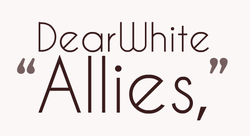 What Can White Allies Do? So often, white allies ask me, “What can I do? What can I do?” I get it. They are overwhelmed. They want to do something but don’t know where to begin. I get it. But sometimes, I just want to scream, “I. Don’t. Know.” I don’t know, dammit, because really, sometimes, I just don’t have a clue. I wake up some mornings and I read or hear a story that gives me hope. A story where a crime was interrupted by some kindhearted stranger or some child steps up and stops a bullying situation. Those stories make me believe in humanity. Those stories make me feel like maybe, just maybe we can figure out this thing called Life. But then there are other mornings when I wake up and I think, “We are screwed. We are so screwed.” Sadly, I’ve been feeling that last emotion more and more. More and more, I find myself focusing on the names and the faces of those cut down by the bullets and the hands of those who were hired to serve and protect and I wonder, where is the love? Where is the kindness? Where is the humanity? I think about Michael Brown. Eric Garner. Kajieme Powell. Rumain Brisbon. Akai Gurley. John Crawford. Yvette Smith. Miriam Carey. Johnathan Ferrell. Rekia Boyd. Shereese Francis. Aiyana Jones. Sandra Bland. Tamir Rice. And the names go on and on and on and on and on and…On. I ask myself, what can white allies do to help right this ship? What can they do to help stop this madness? I grapple between wanting to say, “Figure it out yourself,” to wanting to have something concrete to offer up. So, below are just a few suggestions that you can do if you are feeling helpless like so many of us:
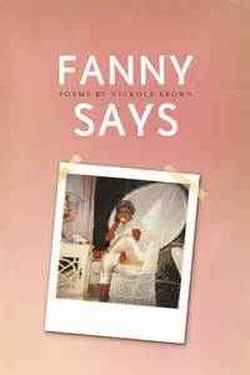 Nickole Brown has written another masterpiece. Yes, I said it. A masterpiece. Fanny Says is a rollicking tribute to Nickole’s unapologetic, sassy grandmother, Fanny. Similar to Nickole’s tender, yet raw tribute to her sister in her 2007 novel-in-poem, Sister, we get to see the rough edges, the underbelly of this irreverent but loving grandmother through Nickole’s amazing poetic acrobatics that truly illustrate the fact that Nickole knows how to turn a phrase and she isn’t afraid to show her grandmother’s blemishes as well as her beauty marks. Fanny Says is 138 pages of lush language, written in the dialect of those warm spirits from Nickole’s old Kentucky home, but contrary to some writers, Nickole doesn’t poke fun or make caricatures out of the people of her youth – No – she gives the reader a true glimpse into a world where a word like fuck takes on a whole new meaning when uttered by the acerbic tongue of Miss Fanny. Grandma Fanny takes this one word and turns it into, of all things, a term of endearment. Nickole writes of the “f” word that would regularly flow from the lips of her grandma: [it is] often preceded by well, with the “u” low as if dipping up homemade ice cream, waiting to be served last so she’d scoop the fruit from the bottom, where all the good stuff had settled down. As I mentioned, Nickole does not censor her portrayal of her grandmother, and as a result, the reader is given a glimpse into the type of southern women I grew up around. The type of women who loved hard even when life didn’t love them back with the same fire and fierceness. The type of women who said awful, hurtful things out of ignorance and their own stubbornness, but were still the type of women who would fight to the death for their kin and their friends. There were places in the book where Fanny did not endear herself to me. To be honest, there were times during my reading of Fanny Says when I flinched from Nickole’s raw portrayal of her grandmother, Fanny. I found myself putting down the book several times, saying to myself, “I can’t deal with this woman anymore.” But I always found myself coming back to the book. That’s what Nickole’s writing does to you. She cuts you open with her writing, making you flee from it, determined to not go back to it, and then she offers you a gentle linguistic balm that pulls you right back into the text. Any writer worth her salt can write a loving tribute to her grandmother that makes the grandmother seem to be a cross between June Cleaver and Carol Brady, but it takes a gutsy writer to expose to the world both the darkness and the light within her grandmother, and never utter one apology. Congratulations to Nickole for doing it again with this, her sophomore effort. A true tour de force. For more information about this incredible writer and her new book, Fanny Says, click here.  We have all, myself included, lived our lives under the disillusionment that the real dangerous racists were all ignorant, unemployed, one-dimensional caricatures. The kind who had broken down Chevy trucks, drank Papst Blue Ribbon beer, lived in trailer parks and barely had a junior high school education. We thought we could spot them a mile away. We thought we knew them so well that there was no way they could sneak up on us because, hey, they had nothing to fuel them but their hate and we believed our power to love would always outweigh their hate. We have hoodwinked and bamboozled ourselves. Racists, the real dangerous ones, are everywhere. They have infiltrated our government. A vast number of them are the ones who shape the laws and decide who gets the "lighter" sentences and who gets to serve for life. They also get to vote up or down on issues that will send clear messages to the poor and disenfranchised, to the black and brown, and to any others who are not white, wealthy, male, Christian, heterosexual, and able-bodied -- messages that say, "we will destroy you one unfair law, one unfair practice at a time." Some of them are doctors and nurses, making sure the poor and disenfranchised don't quite get the same attention as those who look and sound like them. A few of them have found their way into our schools, "educating" our children by leaving out those parts of history that show a more well-rounded version of what really happened in our nation and our world. And some of these racists benevolently tell one group of children that they are "hyper" and "loners" while telling another group they are "bad" and "thugs." And some of them actually have the unmitigated gall to stand in our pulpits on Sunday, preaching "God's word" to their flock, while knowing there sits among them the biggest Judas Iscariots of them all. And finally, quite a few of them have befriended us on social media, making us believe they "don't understand" all of this "race stuff" because they don't "see color" and they wish everyone would just "move on" and "let it go" because, anyway, "all lives matter." Meanwhile, they cling to their racist flags and statues of killers and slave owners desperate for those iconic symbols of hate to stand in our government buildings so that they can very consciously send the message to all black and brown skinned people, "you do not matter." They make martyrs out of little known family members who fought in the Civil War in order to make the owning of brown and black people an institution that would have quite possibly continued for another 400 years had the south not lost that war. Racists, the real dangerous ones, are everywhere and not necessarily where we all thought they were hiding because, really, they aren't hiding. They work with us. They live around us. They wave and smile and wink, making us believe they aren't a threat when really, they are the biggest threat of all because they are undercover racists. They wear business suits and sensible shoes. They vote. They drive nice cars. They eat at fancy restaurants and they own property. But as more and more changes begin to happen in society where they are seeing themselves lose their stronghold, they are weakening and outing themselves and not just in a subliminal manner. They are spewing their hate and showing their disdain of black and brown people by giving press conferences and status updates on social media. They are starting arguments at the water cooler and disrupting meetings in order to try and regain their power. I say we let them self-destruct. It's time they get the picture. We will not surrender. We will not retreat. They will not win.  “I took one look at you, and I knew I didn’t want you.” Just typing the words are gut wrenching. Who says that to another person? Who says that to a person they raised as their child? Their only child? The first time those words were spoken to me were on my 46th birthday last year, but if I am to be honest, I knew all along that only one of the parents who raised me really wanted me. My daddy. My heart. My first love. But, it still stung to hear the sentiment spoken out loud. I was having a good day. Forty-six was feeling good on me. I had recently published my first novel and I was busy going on a tour to promote it. The reviews were favorable, and you might say, I was soaring above the clouds last year. Then the call came. Something told me not to answer the phone. I knew my adopted mother. She had the unique knack of knowing exactly how to ruin an otherwise wonderful day with nothing but her words. But I decided to answer the phone anyway. Big mistake. The call started off nice enough. “Happy Birthday. How are you? What are you doing today?” And then…the proverbial left shoe dropped. “Angela, did I ever tell you about the day M.C. and I picked you up from the adoption agency?” Well, yes, she had. But for all I knew, she was going to tell me something different, something that might make us closer, so I responded, “Yes ma’am, but you can tell me again.” I think I even smiled. But then she said the words, “I took one look at you, and I knew I didn’t want you.” “What did you say?” I asked in response. Surely, I didn’t hear what I thought I heard. But she repeated the words. As if she was telling me something to make my day a bit better. She even sounded happy as she uttered the words again. “Yes, I took one look at you, and I knew I didn’t want you, but your daddy did. So I went along with it. Eventually, you grew on me.” I was floored. Emotionally pistol-whipped by her words. “I’ve got to go,” I said, choking back tears. Choking back my grown up tears, and the tears of the little girl that still lives inside of me, whose spirit is easily wounded. “Alright,” she said, still sounding chipper. Still sounding like she hadn’t just aided and abetted in my digression back into the little girl who never truly felt wanted. The little girl who cried herself to sleep because her daddy’s love wasn’t enough for her. She wanted her mommy’s love too, but it never came. The second time those words were uttered by my adopted mother were less than a week ago. She lay in a hospital bed. I drove 12 ½ hours, alone, barely stopping to rest, to see what I could do to help her. To see if maybe she would allow me to be her daughter, even if it was for one last time. But, it did not take long for her to see my acts of kindness as acts of control. So with a venomousness that I can’t even fathom, she uttered the words again. “I never wanted you.” I have tried to imagine the level of bitterness and hate that would make a human say such spiteful words to another human. Jealousy? Self-loathing? Evilness? I don’t know. But I do know this. Words bite. Words bite into the soul and can cause damage that is the equivalent of a slap to the face or a punch in the gut but the difference is, we carry the pain from words for a lifetime, often. You would think that my being a writer would have already alerted me to that fact, and in a way, I guess I did know that. But hearing such mean words spoken. Seeing the lack of love in the eyes of someone whose love I always craved yet never fully received. Hurt. Still does. Probably always will. It particularly hurt because yet again, I put myself out there to be hurt once more by someone who clearly did not want or desire my presence. “You are not my family,” she said. For years, I knew this was how she felt, but to hear the words spoken—spoken out of the mouth of someone who is in her final years. Someone who should be preparing for her transition, filling her spirit with love for herself and all around her. It’s sad. Tragic, even. But on that day, in that hospital room, I made the decision that I will not willingly participate in another person’s journey down the abyss. I choose to save me. I choose to stop running after the love from someone who is incapable of loving – or at least, incapable of loving me. I choose to stop hurting because she can’t love me the way I need and deserve to be loved. I choose to start living in joy and not someone else’s pain anymore. I choose me. And by choosing me, it means closing doors, but opening new ones, and sometimes, opening new doors is the best way to heal and become whole. |
Archives
March 2021
Categories
All
Blog Roll
|
 RSS Feed
RSS Feed







